Review for 71 - Into The Fire
Introduction
There's something that is just so tragic and chilling about the Korean War, which even now 60 years on, to this dispassionate observer seems so raw and depressing. There have been more devastating and bloody conflicts, both before and since, manmade charnel houses in all corners of the world. Yet Korea's plight seems all the more disheartening, as it is a civil war, a conflict of brother against brother. What's more there's no ethnic, religious or cultural divide as happens in most such conflicts, it's a war of ideologies, and worse, ideologies imposed from without. Five years after the end of the Second World War, Russian and Chinese sponsored Communism in the North was pitted against US sponsored Capitalism in the South. It took just five years for ideology to irrevocably tear apart a nation. And now, we've had wars in South East Asia, in Eastern Europe, in the Middle East, Communism has died, Capitalism has triumphed and doesn't know what to do with itself, the Cold War is over and new ideologies threaten the world, yet the war between North Korea and South Korea still continues. There was never a peace treaty, only a wafer thin and imperfect ceasefire that has for the most part held for the last half century. The Korean situation remains a lit powder keg hoping for someone to extinguish the fuse before it's too late. It's the most likely flashpoint for a conflict in the modern world, which makes movies about how such a situation arose all the more interesting. This March, Cine Asia brings 71 Into The Fire to the UK, a story based on true events that occurred at the start of the Korean War.
When the war began in the summer of 1950, the South and its allies were taken completely by surprise, and the North, backed by its Communist neighbours, rapidly overwhelmed the South, pushing through almost to the ocean. In desperation, the students of the South began to volunteer to defend their country. These student soldiers were hardly trained, ill-experienced, and little more than cannon fodder. They were also all that stood between survival and absolute defeat. Oh Jang Beom was one such student soldier, put to use carrying ammo to southern defenders through hard fought urban battlefields. There was little that they could do against the overwhelming numbers of the North, and the order was given to retreat, and in that one moment when Oh Jang Beom was called upon to stand up, he was found wanting. He and the survivors wind up in the Pohang Girls Middle School, hastily converted into a field hospital and field command, and the bridge behind them is blown up, hopefully to slow the North down.
The North is relentless though, and soon the conflict widens across the front. The decision is made to send the army units at Pohang to reinforce the defensive lines. But Pohang itself is a key strategic point. All there remains to defend that point are 71 student soldiers, most of them freshly recruited and newly arrived. Only three have been in the army for any length of time, and the only one with actual battle experience is Oh Jang Beom. Against his wishes, he's put in command of the group. Not only does he have to train a bunch of new recruits, he has to earn their respect, which isn't easy given his timid nature, and the presence of a couple of delinquents using the army as an alternative to prison. But the defenders of Pohang have run out of time, as the Northern Commander has ordered 766 of his shock troops to swim across the river and take Pohang.
Picture
71 Into The Fire gets a 2.35:1 anamorphic transfer that is clear, sharp, with consistent colours, and most importantly when it comes to Asian cinema on DVD, is a native Film-PAL conversion. It's a fine transfer as well, with little in the way of compression artefacts, or damage to the film. As seems to be the vogue with war cinema these days, it tips the hat to Saving Private Ryan and Band of Brothers for its frenetic and dynamic cinematography, its de-saturated colour palette, and its hyper-real visual aesthetic. If there is one nit that I might pick, it's an excessive sharpness that hints at a little edge enhancement, but I can't tell whether that is an artefact of the DVD transfer, or a sign of the hyper-realistic visuals. The effects are of consistently high quality, and the action sequences are intense and arresting. CGI is applied liberally, but rarely will you be able to distinguish it from practical effects. On occasion action sequences did lack dimension, as if the budget wasn't there to completely fill the frame, but this was a rare occurrence. 71 Into The Fire is also released on Blu-ray
Sound
You have a choice of DD 5.1 and DD 2.0 Korean with optional English subtitles. The surround is very effective in bringing the action scenes into your living room; while the dialogues is clear throughout. One slight niggle is that the English dialogue in the film is subtitled as well, and it might have been more useful to have two subtitle tracks, one Hard of Hearing with everything subbed, and a normal one with only the Korean dialogue translated. There also is an ill-placed layer change to contend with.
Extras
Cine Asia offer their usual splendiferous animated menus, and the extras are split across two discs.
Disc 1
The Main Feature gets a trailer gallery with the UK and Original Trailers, as well as a collection of 12 trailers for other Cine Asia releases. One new title to look forward to is the action packed period movie, Detective Dee and the Mystery of the Phantom Flame.
You'll also find an audio commentary on this disc, where Korean Cinema expert Mike Leeder joins Bey Logan. It's a commentary track that supplies a relentless torrent of facts, mostly about Korean Cinema and Asian Cinema in general. As usual it's very interesting and easy to listen to. From what I sampled though, I think they missed a trick by not approaching the commentary with a more historic perspective; perhaps a military historian guesting on the commentary track may have made for something a little more focused.
Disc 2
That historical perspective is certainly addressed by the most prominent feature on the second disc however. Men of Valour, Personal Reflections on the Korean War lasts 27 minutes, and has contributions from 3 US veterans of the conflict, as well as 2 South Korean veterans, who describe their experiences of the forgotten war.
Into the Fire - Making of Documentary lasts 20 minutes, and does just what you would expect, featuring behind the scenes footage as well as interviews with the cast and the director, Lee Jae Han. He also discusses the balance between dramatic licence and reality.
Behind the Scenes lasts 7½ minutes and offers b-roll footage, without voiceover, but with plenty of asides from the subjects in camera at that moment.
Pre-Production lasts 8 minutes, although really offers more of the Making Of documentary, with interviews and footage, rather than focusing particularly on the technicalities of storyboarding, location hunting, and the research that you would usually associate with pre-production.
Production Design lasts 10 minutes and offers brief snippets into the work of the make-up artists, the costume designer and the set designer, as they set about bringing the reality of 60 years ago into the modern world.
Student Soldier - Trainees From The Korean War lasts 8 minutes, and takes us to the real Pohang Girls Middle School, and introduces us to two survivors of the actual battle dramatised in this film, two of the student soldiers.
The rest of the featurettes look at the publicity behind the film, the photographer at work behind the film's poster for 6 minutes, 5 minutes worth of Premiere and Press Interviews, and 5 more minutes of the same in a Showcase. The level of screaming around the red carpet is a little surprising until you realise that the star of the film is also one of Korea's top pop idols. Imagine Justin Beiber in a war movie?
Conclusion
Apparently, just calling this film 71 would have been enough in South Korea, so ingrained in the culture are the events depicted in this film. For foreign audiences, we get something a little less esoteric, which is useful, as this really isn't a film that ought to be dismissed because of a perceived obscurity in its title. It's as thrilling and exciting a war movie as any really, taking a leaf from modern epics like Saving Private Ryan when it comes to action and visuals. The effects and production values are of high quality throughout, and the story and the characters are certainly very engaging.
That said, 71 Into The Fire does come across more as a piece of entertainment than any serious study of the Korean War. The director states in the extras that the film combines reality with a fair bit of dramatic licence, and indeed its starting point may be the actual events of 1950, when North Korea's blitzkrieg invasion took the South by surprise and threatened to overwhelm the nation. The student soldiers were indeed a real group, young volunteers who stood up to defend their nation in its time of need, and the desperate battle at Pohang Girls Middle School really did take place. However, the characters and their back-stories, as well as the specific events chronicled in this film are a narrative creation. We meet a student soldier who is completely out of his depth on the front line, and we see his initial faltering steps in conflict, and we then follow him as he faces even more adversity, as he's placed in charge of a group of student soldiers, and ordered to defend a key strategic point. If that isn't enough adversity, he finds himself in charge of a couple of delinquents, who aren't too keen on following orders. It's a rites of passage movie, and we see boys become men in the most trying of circumstances.
Their foes too are interesting, with the Northern army shown as relentless and ruthless, with a charismatic and cruel commander. Yet this commander is shown to be an honourable man in his own way, while the true evil comes from his political officer, the slimy preacher of the party line that is a familiar character in films like this. It's a battle against overwhelming odds, where boys do indeed become men, where lasting friendships are forged, and all the other clichés from films such as this make an appearance at some point. The pacing and balance is spot on, with intense bursts of action interleaved with reflective character moments, and the story builds up to an emotional and resounding climax that is just jingoistic enough to fill the viewer with a sense of triumph at the end of the film, but never too much that it leaves a sour taste. It's very well designed entertainment, with just the added poignancy that it's a fictionalisation of an actual event. It's probably what Pearl Harbour wished it could have been.
Yet when it comes to commenting on the war, and the situation that has since resulted in Korea, it doesn't quite have enough to say. It certainly doesn't have the poignancy of say Brotherhood for example, while Park Chan Wook's JSA is a far more biting and affecting examination of the Korean situation, if from a contemporary perspective. 71 Into The Fire is more about manipulating the viewers' emotions rather than the provoking the intellect. But what it does, it does very well. It's definitely worth a look if you like your war movies with plenty of action.
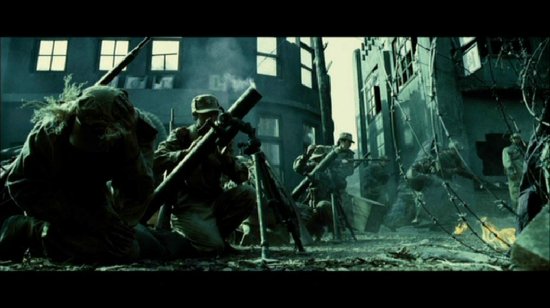
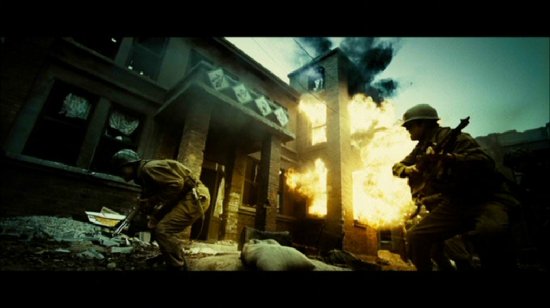
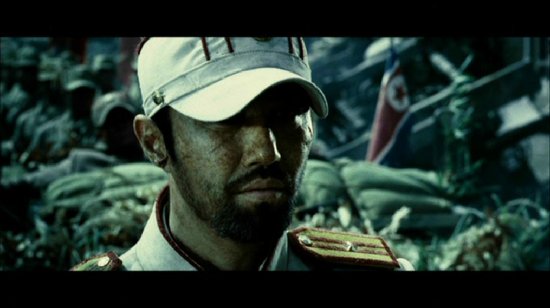
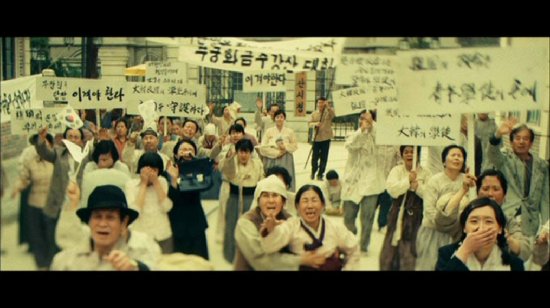
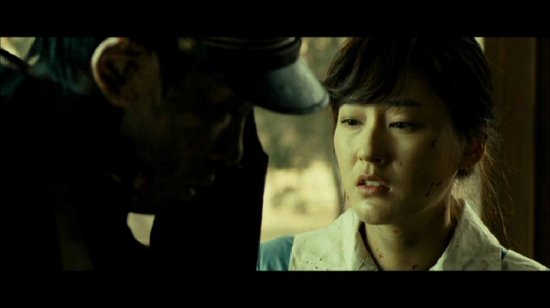
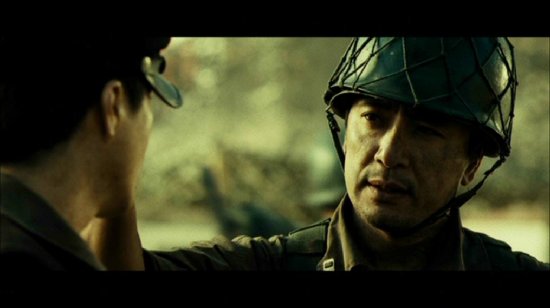
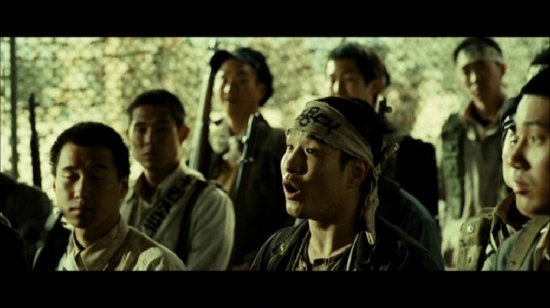
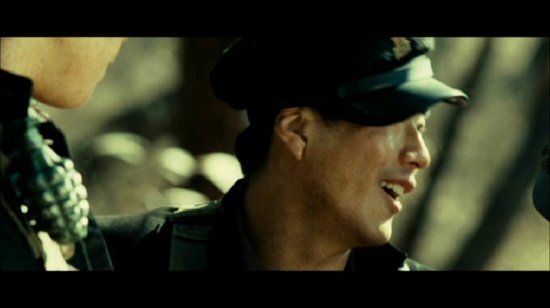
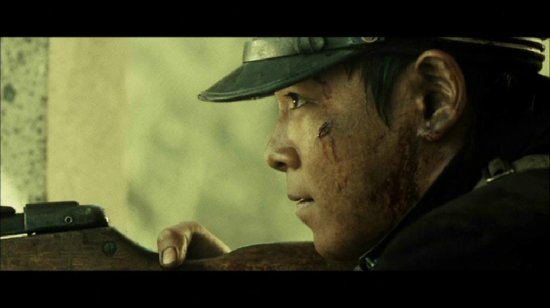
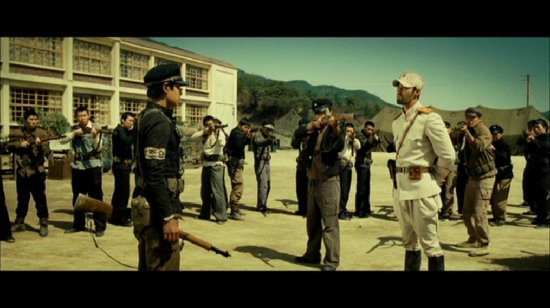
Your Opinions and Comments